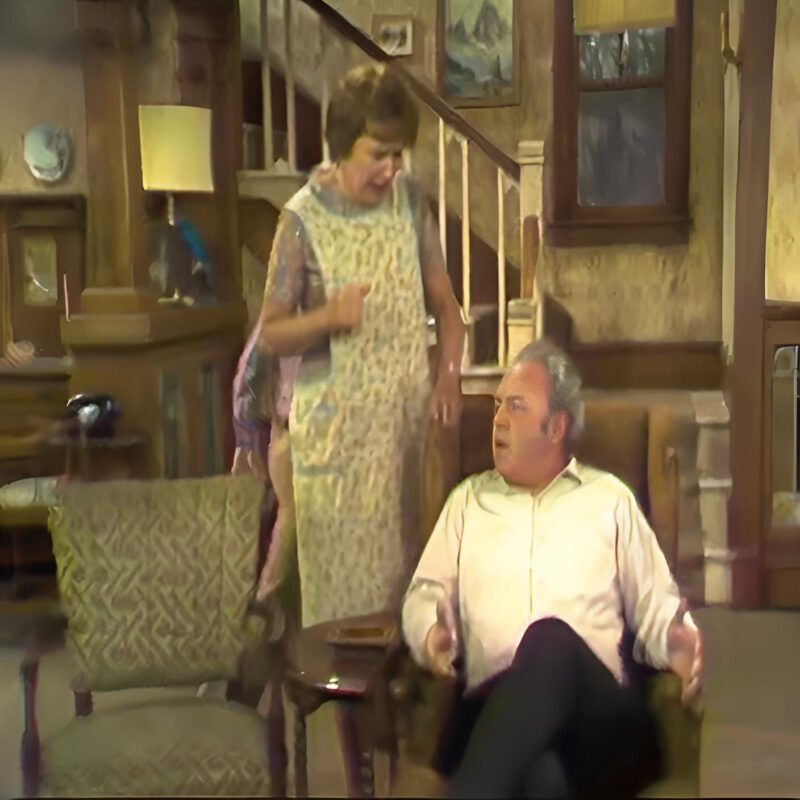
If Americans were one great, big, diverse, dysfunctional family, then Norman Lear, who created some of the most influential TV shows of all time, knew that keeping the lines of communication open—even if that meant screaming at each other—was crucial to staying united. This principle animated his work throughout a seven-decade Hollywood career of unparalleled influence and a lifetime of advocacy for progressive causes such as civil rights, conservation, feminism, free speech, and the separation of church and state.
Lear passed away from natural causes at his Los Angeles home on Tuesday, Dec. 5, his family confirmed via a statement shared on the TV icon’s website. He was 101.
The instinct to talk through our differences and honor our common humanity made Lear one of the greatest comedy writers of his generation. His politically engaged sitcoms—All in the Family, Maude, Good Times, The Jeffersons, and more—turned their simple living-room sets into weekly group-therapy sessions for a peak audience of 120 million. His contributions continue to influence a diverse group of television writers and showrunners today.
When All in the Family premiered on CBS in 1971, it resembled no other family sitcom. Archie Bunker (Carroll O’Connor), the archetypal conservative, white, working-class patriarch, ruled over his Queens home like a tyrant—bellowing orders at his daffy wife, Edith (Jean Stapleton), and clashing with his daughter Gloria’s (Sally Struthers) hippie husband, Mike (Rob Reiner). The Bunkers confronted social change as sexual mores loosened and their neighborhood integrated. “People still say to me, ‘We watched Archie as a family, and I’ll never forget the discussions we had after the show,’” Lear recounted in his 2014 memoir, Even This I Get to Experience. “That was the ripple effect of All in the Family. Families talked.”
Despite Lear’s liberal sympathies, his characters were never one-dimensional. Gloria’s feminist consciousness revealed Mike’s unexamined male-chauvinist tendencies, suggesting he had more in common with Archie than he liked to admit. Family’s fifth season helped humanize Archie, opening with a timely look at how the Bunkers weather the inflation crisis. While the media description of Archie as a “lovable bigot” was glib, it acknowledged the reality that people with prejudices or belligerent personalities could still care for and be cherished by those closest to them. Love and empathy could potentially overcome ignorance, making tough conversations worthwhile.
This unique combination of gritty social realism and optimism about dialogue creating positive change spilled over into Lear and co-creator Bud Yorkin’s subsequent projects. Maude, spotlighting Edith’s cousin played by Bea Arthur, tackled issues like abortion, with a groundbreaking episode pre-dating Roe v. Wade. Lear identified deeply with Maude’s liberalism, guided by her moral compass.
Lear made his biggest impact in the 1970s, as new movements and economic woes divided Americans. He was committed to depicting diverse experiences, with shows like Good Times and The Jeffersons addressing race, class, and social issues. Lear responded to criticism by creating The Jeffersons, showcasing a prosperous Black family navigating race and class dynamics.
Lear’s fascination with the American nuclear family stemmed from his own painful childhood. Born in New Haven, Conn. on July 22, 1922, to Jewish parents, his father’s arrest for selling fake bonds led to a disrupted upbringing. His father, Herman, became the model for Archie Bunker. Lear attended Emerson College but dropped out after Pearl Harbor to enlist in the military. He later married Charlotte Rosen, and their daughter Ellen was born in 1947.
Lear’s comedy writing career began in the 1950s, working on classic TV variety programs and movies. The sensation of All in the Family shifted his focus to TV in the 1970s, despite initial resistance from network executives. At his peak, Lear had nine shows on the air. His influence was so deep that Richard Nixon put him on his notorious Enemies List.
By the 1980s, Lear scaled back TV commitments, focusing on politics and philanthropy. He co-founded People for the American Way in 1981 to combat right-wing extremism. He purchased a rare original copy of the Declaration of Independence, touring it to encourage democratic participation. As a philanthropist, he supported progressive causes and endowed the Lear Family Foundation.
Lear married Lyn Davis Lear in 1987, co-founding the Environmental Media Association and raising three children. By the 2020s, he was celebrated as an elder statesman. Along with numerous awards, he was among the first inductees into the Television Hall of Fame. In 2019, he co-hosted Live in Front of a Studio Audience, recreating episodes of his classic shows.
Lear’s influence spread to younger creators, inspiring shows like Black-ish and The Carmichael Show. He collaborated on a 2017 reboot of One Day at a Time, featuring a Cuban American family and addressing contemporary issues. Lear’s characters, tough or ignorant on the outside, were capable of change, making them worthy of primetime attention. “I consider myself a writer who loves to show real people in real conflict,” Lear told TIME in 1976. “I want my shows to be funny, outrageous, and alive. So far, so good.” His assessment holds up 43 years later.
